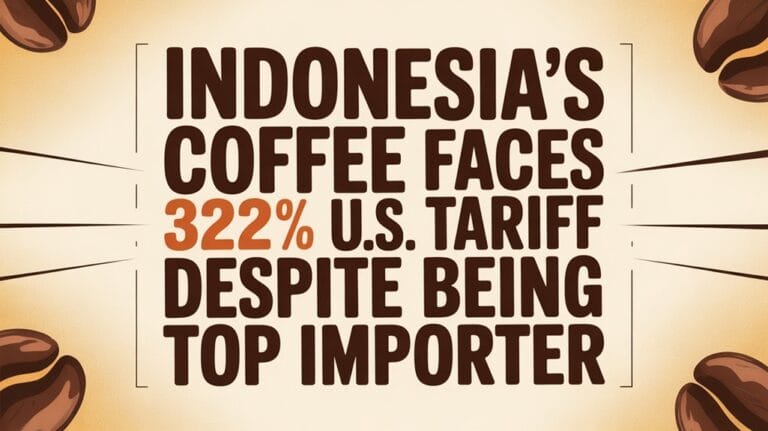Indonesia is pushing for the removal of U.S. tariffs on its coffee exports to improve competitiveness amid rising production. The country’s coffee trade faces a 32% U.S. tariff introduced under previous administrations, a hurdle Jakarta wants erased through tariff negotiations.
With Indonesia’s coffee output projected to rise 5% to 11.3 million 60-kg bags in 2025/26, fueled by favorable weather and better farming tools, the focus is on broadening exports. Robusta coffee dominates production, making up 87% of output, while exports are expected to climb 7% to 6.5 million bags. But sluggish domestic consumption—just 4.8 million bags—means Indonesia relies heavily on foreign buyers like the U.S., its top importer despite tariff disputes. The origin of coffee in Ethiopia established early cultural and trade significance that still influences global markets today. The resilience of Robusta coffee to climate change ensures that it remains a vital crop for Indonesia’s coffee-producing regions.
Sumatra produces 70–75% of Indonesia’s coffee, with South Sumatra, Lampung, and Bengkulu growing robusta and regions like North Sumatra and Java specializing in arabica. Green bean imports are expected to drop to 400,000 bags in 2025/26 as local robusta supplies grow, reflecting improved domestic availability. Small farmers, who manage 98% of coffee farms, often struggle with limited resources.
U.S. tariffs undercut their competitiveness, pushing buyers to suppliers without such duties. The zero-tariff demand aims to level prices and secure Indonesia’s position in the U.S. market. But uncertainty over tariffs risks slowing export growth even as production rises. Compliance with EU Deforestation Regulation adds another layer of complexity for exporters targeting European buyers.
High tariffs also pressure Indonesia to investigate alternatives, like ready-to-drink coffee products, and find new markets. Domestic demand isn’t filling the gap, with cost-conscious consumers favoring cheap options over premium blends. Middle-class spending stays weak, leaving farmers dependent on exports.
Labor shortages in arabica-growing highlands further complicate expansion. Coffee remains essential to Indonesia’s economy, supporting millions of smallholders in rural areas.
The push for tariff-free access to the U.S. reflects broader efforts to safeguard this key commodity amid global trade shifts. While a paused tariff offers temporary relief, Indonesia seeks permanent changes to avoid future disruptions.
Success could amplify export earnings and stabilize livelihoods, but delays might force farmers to adapt under tighter margins. As talks continue, Indonesia’s coffee sector balances optimism over rising harvests with caution over unresolved trade barriers.





